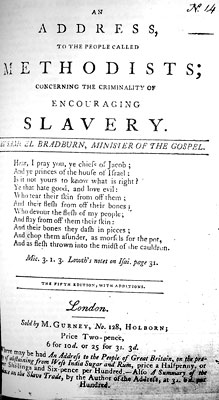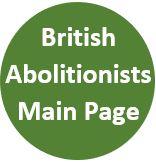Martha Gurney (1733-1816)
By Timothy Whelan

Biography
Between 1788 and 1796, no British woman played a more prominent role in raising the consciousness of the English people against the slave trade than Martha Gurney (1733-1816). During those years, Gurney printed and/or sold fourteen abolitionist pamphlets, placing her second only to the Quaker James Phillips in the number of abolitionist works printed or sold in London during the height of the slave-trade controversy. Although a number of women contributed works, both in poetry and prose, to the campaign to abolish the slave trade, Martha Gurney was the only woman who was actively involved as a printer/bookseller. Unfortunately, she has never been recognised for her work in the abolitionist debate of the 1790s.The daughter of Thomas Gurney (1705-70) and the sister of Joseph Gurney (1744-1815), both prominent stenographers for the Old Bailey and Parliament, Martha Gurney was, like the rest of her family, a staunch Particular Baptist. She never married, earning a 'comfortable subsistence, and, ultimately, a small independence', her nephew William Brodie Gurney would later write, from her printshop, first in Bell-yard and later in Holborn. Between 1770 and 1813, her name appeared as printer or seller on more than 130 titles, including twenty-five editions of state trials and other court proceedings transcribed by her brother between 1781 and 1813. Besides printing and selling sermons, court trials, and abolitionist pamphlets, Gurney's name also appeared on the title pages of thirty-four political pamphlets between 1788 and 1802, all of which advocated political reform. Between 1791 and 1794 she collaborated with William Fox, radical political pamphleteer and bookseller, in printing or selling sixteen pamphlets, one of which, An Address to the People of Great Britain, on the Propriety of Abstaining from West India Sugar and Rum (1791), went through twenty-six English editions within one year, with contemporary estimates of more than 200,000 copies sold or given away, becoming the most widely distributed pamphlet of the eighteenth century.
William Fox was a minor bookseller at 128 Holborn Hill from 1773 to 1794. In 1782 he entered into a business arrangement with Martha Gurney, who that year moved her bookshop from 34 Bell-yard into his quarters in Holborn. He and Gurney operated as booksellers from the same address until 1794, when his name disappears from title pages. Martha Gurney's merger with Fox may have been both a business and domestic collaboration, an arrangement beneficial to each party, since both were well past middle age at that point. Whatever the reason, the merger brought a new dimension to 128 Holborn Hill, for Gurney was an active printer as well as seller, whereas Fox had appeared strictly as a bookseller since 1775. Her printing expertise and opposition to the slave trade provided Fox with the necessary means (and possibly the stimulus) for his distinctive transformation (and, in many respects, hers as well) from a minor bookseller into one of the most significant voices in the public debate over the slave trade and political reform in the early 1790s.
The printing and selling of Fox's Address was not Martha Gurney's first abolitionist pamphlet. Late in 1788 her name appeared as seller for James Dore's A Sermon on the African Slave Trade, printed the next month on behalf of the Baptist congregation at Maze Pond in conjunction with Granville Sharp's Society for Effecting the Abolition of the Slave Trade. Gurney's commitment to abolition grew steadily thereafter, as did that of her brother, Joseph, who had been a subscriber to the Abolition Society from its inception in 1787. Through his role as shorthand writer for Parliament, he had immediate access to the proceedings on the slave trade debate in Parliament in 1791 and 1792, giving Martha Gurney a distinct advantage over every other Dissenting printer in London.
The success of the Address was extraordinary, spawning one of the most strident pamphlet wars of the 1790s. Emotions ran high on each side of the slave trade issue, and Gurney's pamphlets, nearly all of which promoted the sugar boycott, played a central role in galvanising support among the abolitionists and contempt from their opponents. As Thomas Clarkson traveled around England in the autumn of 1791, he noted that the effect of Fox's Address was evident everywhere he went.
Not only was Martha Gurney printing and selling abolitionist pamphlets and sermons, but, according to her nephew, 'display[ing] openly in her shop the section of a slave ship, with its living cargo stowed for the voyage …' This was, of course, the large fold-out drawing of the slave ship Brookes which had been commissioned by the Abolition Committee in March 1789 and published the next month. 'Her efforts in this cause', W. B. Gurney says of his aunt, 'brought her to the acquaintance of some of the most intelligent Quakers, who valued her as a coadjutor, engaging as she did in the circulation of these pamphlets, not so much as objects of trade as means of promoting the benevolent design.' One of these Quakers was a young man named William Allen (1770-1843), whose The Duty of Abstaining from the Use of West India Produce; a Speech, Delivered at Coach-Maker's-Hall, Jan. 12, 1792 was sold by Gurney. By 1794, Gurney would print or sell two more abolitionist pamphlets by William Fox: A Summary View of the Evidence Delivered before a Committee of the House of Commons, Relating to the Slave Trade (1792) and A Defence of the Decree of the National Convention of France, for Emancipating the Slaves in the West Indies (1794) as well as abolitionist works by Richard Hillier, William Bell Crafton, Andrew Burn, the Baptist minister John Liddon of Hemel Hempstead, the popular Methodist preacher Samuel Bradburn, and the American Presbyterian minister, David Rice.
In 1824, Elizabeth Heyrick reinvigorated the abolitionist movement by calling once again, like William Fox, for a boycott of West Indian produce in her pamphlet, Immediate, not Gradual Abolition; or, An Inquiry into the Shortest, Safest, and Most Effectual Means of Getting Rid of West-Indian Slavery. Six years later, E. R. Edwards, a Birmingham printer, reissued An Address to the People of Great Britain, on the Propriety of Abstaining from West Indian Sugar and Rum, linking the two abolitionist movements together and allowing William Fox and Martha Gurney to bask once again in the light of a truth they had laboured so valiantly to declare nearly forty years before.
Text © Timothy Whelan, 2008
Bibliography
Selected Abolitionist Works Printed or Sold by Martha Gurney
- Dore, James. A Sermon on the African Slave Trade. 3rd. ed. London: Printed for J. Phillips, and sold by J. Buckland; C. Dilly; M. Gurney; and W. Button, 1788.
- Fox, William. An Address to the People of Great Britain, on the Consumption of West-India Produce. 1st ed. London: Printed for James Phillips, and sold by M. Gurney, 1791.
- Hillier, Richard. A Vindication of the Address to the People of Great Britain, on the Use of West India Produce. With Some Observations and Facts Relative to the Situation of Slaves. In Answer to a Female Apologist for Slavery. London: Sold by M. Gurney . . . and T. Knott, 1791.
- —. A Vindication of the Address to the People of Great-Britain, on the Use of West India Produce … The second edition, with strictures on her Reply to a Reply. London: Sold by M. Gurney, L. Wayland, and T. Knott, [1791].
- Allen, William. The Duty of Abstaining from the Use of West India Produce; A Speech, Delivered at Coach-Maker's-Hall, Jan. 12, 1792. London: Printed for T. W. Hawkins, and sold by M. Gurney, 1792.
- Fox, William. A Summary View of the Evidence Delivered before a Committee of the House of Commons, Relating to the Slave Trade. London: Sold by M. Gurney, T. Knott, and C. Forster, 1792.
- Crafton, William Bell. A Short Sketch of the Evidence, Delivered before a Committee of the House of Commons, for the Abolition of the Slave-Trade. London: Sold by M. Gurney, 1792.
- Anonymous. Considerations addressed to professors of Christianity of every denomination, on the impropriety of consuming West-India sugar and rum as produced by the oppressive labour of slaves. 2nd ed. corrected. London: Printed by Ritchie and Sammells; sold by M. Gurney, 1792.
- Bradburn, Samuel. An Address to the People called Methodists, concerning the Criminality of Encouraging Slavery. London: Sold by M. Gurney, 1792.
- Liddon, John. Cruelty the Natural and Inseparable Consequence of Slavery, and both Diametrically Opposite to the Doctrine and Spirit of the Christian Religion: Represnted in a Sermon, Preached on Sunday, March 11th, 1792, at Hemel-Hempstead, Herts. London: Sold by C. Dilly, M. Gurney, T. Knott, and Mr. Chapman, Hemel-Hempstead, 1792.
- Burn, Andrew. A Second Address to the People of Great Britain; Containing a New and Most Powerful Argument to Abstain from the Use of West India Sugar. London: Printed for M. Gurney, 1792.
- The Negro: a Tale. Addressed to the Consideration of the Humane and Just. London: Published by M. Gurney, and sold by all Booksellers. 3rd. ed., 1793.
- Rice, David. Slavery Inconsistent with Justice and Good Policy; Proved by a Speech Delivered in the Convention, held at Danville, Kentucky. London: Reprinted and sold by M. Gurney, 1793.
- Fox, William. A Defence of the Decree of the National Convention of France, for Emancipating the Slaves in the West Indies. London: Sold by M. Gurney, and D. I. Eaton, [1794].
Selected Secondary Works
- Maxted, Ian. The London Book Trades 1775-1800: A Preliminary Checklist of Members (Kent: William Dawson, 1977), p. 97.
- Salter, William Henry Gurney, ed. Some Particulars of the Lives of William Brodie Gurney and his Immediate Ancestors. Written Chiefly by Himself (London: Unwin Brothers, 1902), pp. 34-35.
- Whelan, Timothy. "Martha Gurney and William Fox: London Baptists and Radical Politics, 1791-94," in Pulpit and People: Studies in 18th Century Baptist Life and Thought, ed. John Briggs (Chester, Paternoster Press, 2008).
The Contributor
Timothy Whelan, Ph.D., is a Professor of English at Georgia Southern University, Statesboro, GA. He has published widely in Romanticism and English Nonconformity, 1750-1830, including several Baptist women writers of that period.Contact: Tim Whelan's homepage



